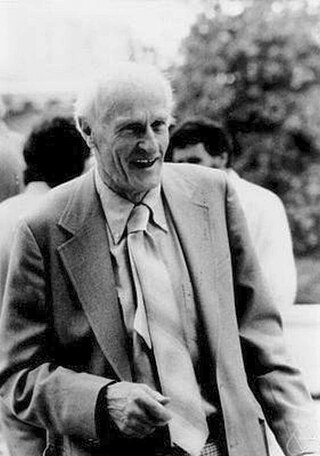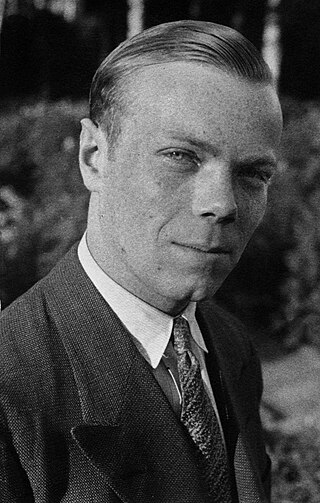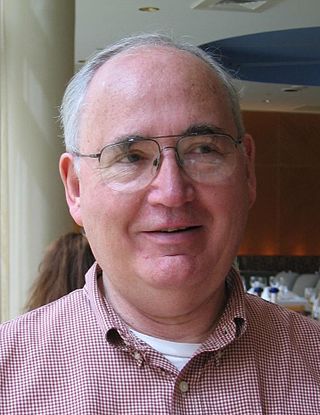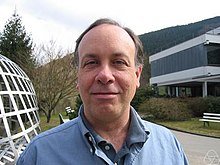Mathematical logic is the study of formal logic within mathematics. Major subareas include model theory, proof theory, set theory, and recursion theory. Research in mathematical logic commonly addresses the mathematical properties of formal systems of logic such as their expressive or deductive power. However, it can also include uses of logic to characterize correct mathematical reasoning or to establish foundations of mathematics.
Presburger arithmetic is the first-order theory of the natural numbers with addition, named in honor of Mojżesz Presburger, who introduced it in 1929. The signature of Presburger arithmetic contains only the addition operation and equality, omitting the multiplication operation entirely. The theory is computably axiomatizable; the axioms include a schema of induction.

Stephen Cole Kleene was an American mathematician. One of the students of Alonzo Church, Kleene, along with Rózsa Péter, Alan Turing, Emil Post, and others, is best known as a founder of the branch of mathematical logic known as recursion theory, which subsequently helped to provide the foundations of theoretical computer science. Kleene's work grounds the study of computable functions. A number of mathematical concepts are named after him: Kleene hierarchy, Kleene algebra, the Kleene star, Kleene's recursion theorem and the Kleene fixed-point theorem. He also invented regular expressions in 1951 to describe McCulloch-Pitts neural networks, and made significant contributions to the foundations of mathematical intuitionism.

Stephen Arthur Cook is an American-Canadian computer scientist and mathematician who has made significant contributions to the fields of complexity theory and proof complexity. He is a university professor emeritus at the University of Toronto, Department of Computer Science and Department of Mathematics.
Gödel's incompleteness theorems are two theorems of mathematical logic that are concerned with the limits of provability in formal axiomatic theories. These results, published by Kurt Gödel in 1931, are important both in mathematical logic and in the philosophy of mathematics. The theorems are widely, but not universally, interpreted as showing that Hilbert's program to find a complete and consistent set of axioms for all mathematics is impossible.

Jacques Herbrand was a French mathematician. Although he died at age 23, he was already considered one of "the greatest mathematicians of the younger generation" by his professors Helmut Hasse and Richard Courant.

Dana Stewart Scott is an American logician who is the emeritus Hillman University Professor of Computer Science, Philosophy, and Mathematical Logic at Carnegie Mellon University; he is now retired and lives in Berkeley, California. His work on automata theory earned him the Turing Award in 1976, while his collaborative work with Christopher Strachey in the 1970s laid the foundations of modern approaches to the semantics of programming languages. He has also worked on modal logic, topology, and category theory.
Proof theory is a major branch of mathematical logic and theoretical computer science within which proofs are treated as formal mathematical objects, facilitating their analysis by mathematical techniques. Proofs are typically presented as inductively-defined data structures such as lists, boxed lists, or trees, which are constructed according to the axioms and rules of inference of a given logical system. Consequently, proof theory is syntactic in nature, in contrast to model theory, which is semantic in nature.
Johan Torkel Håstad is a Swedish theoretical computer scientist most known for his work on computational complexity theory. He was the recipient of the Gödel Prize in 1994 and 2011 and the ACM Doctoral Dissertation Award in 1986, among other prizes. He has been a professor in theoretical computer science at KTH Royal Institute of Technology in Stockholm, Sweden since 1988, becoming a full professor in 1992. He is a member of the Royal Swedish Academy of Sciences since 2001.
Giorgi Japaridze is a Georgian-American researcher in logic and theoretical computer science. He currently holds the title of Full Professor at the Computing Sciences Department of Villanova University. Japaridze is best known for his invention of computability logic, cirquent calculus, and Japaridze's polymodal logic.
Aleksandr Aleksandrovich Razborov, sometimes known as Sasha Razborov, is a Soviet and Russian mathematician and computational theorist. He is Andrew McLeish Distinguished Service Professor at the University of Chicago.
Logic is the formal science of using reason and is considered a branch of both philosophy and mathematics and to a lesser extent computer science. Logic investigates and classifies the structure of statements and arguments, both through the study of formal systems of inference and the study of arguments in natural language. The scope of logic can therefore be very large, ranging from core topics such as the study of fallacies and paradoxes, to specialized analyses of reasoning such as probability, correct reasoning, and arguments involving causality. One of the aims of logic is to identify the correct and incorrect inferences. Logicians study the criteria for the evaluation of arguments.
In proof theory, a discipline within mathematical logic, double-negation translation, sometimes called negative translation, is a general approach for embedding classical logic into intuitionistic logic. Typically it is done by translating formulas to formulas that are classically equivalent but intuitionistically inequivalent. Particular instances of double-negation translations include Glivenko's translation for propositional logic, and the Gödel–Gentzen translation and Kuroda's translation for first-order logic.
In proof theory, the Dialectica interpretation is a proof interpretation of intuitionistic logic into a finite type extension of primitive recursive arithmetic, the so-called System T. It was developed by Kurt Gödel to provide a consistency proof of arithmetic. The name of the interpretation comes from the journal Dialectica, where Gödel's paper was published in a 1958 special issue dedicated to Paul Bernays on his 70th birthday.
A timeline of mathematical logic; see also history of logic.
In propositional calculus and proof complexity a propositional proof system (pps), also called a Cook–Reckhow propositional proof system, is a system for proving classical propositional tautologies.
In computational complexity theory, Håstad's switching lemma is a key tool for proving lower bounds on the size of constant-depth Boolean circuits. It was first introduced by Johan Håstad to prove that AC0 Boolean circuits of depth k require size to compute the parity function on bits. He was later awarded the Gödel Prize for this work in 1994.
Japaridze's polymodal logic (GLP) is a system of provability logic with infinitely many provability modalities. This system has played an important role in some applications of provability algebras in proof theory, and has been extensively studied since the late 1980s. It is named after Giorgi Japaridze.
Bounded arithmetic is a collective name for a family of weak subtheories of Peano arithmetic. Such theories are typically obtained by requiring that quantifiers be bounded in the induction axiom or equivalent postulates. The main purpose is to characterize one or another class of computational complexity in the sense that a function is provably total if and only if it belongs to a given complexity class. Further, theories of bounded arithmetic present uniform counterparts to standard propositional proof systems such as Frege system and are, in particular, useful for constructing polynomial-size proofs in these systems. The characterization of standard complexity classes and correspondence to propositional proof systems allows to interpret theories of bounded arithmetic as formal systems capturing various levels of feasible reasoning.




